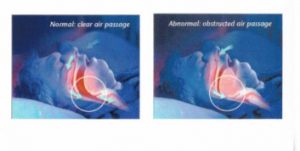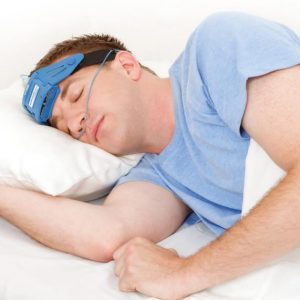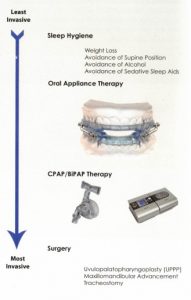A Patient’s Guide to the OSA testing and Treatment Process
Obstructive Sleep Apnea (OSA) is one of the most common sleep disorders, affecting over 20% of the healthy adult population in the  United States. Men and Women of all shapes and sizes can suffer from OSA without ever knowing it. In fact, it is estimated that 90% of the people who have OSA have never been diagnosed.
United States. Men and Women of all shapes and sizes can suffer from OSA without ever knowing it. In fact, it is estimated that 90% of the people who have OSA have never been diagnosed.
OSA occurs when the airway begins to collapse and restricts or completely blocks air from getting into the lungs. It is common for this to happen a few times each night, even in people who do not have OSA. When a person does have OSA it can happen anywhere from 5 to over 100 times per hour and most of the time, the person has absolutely no idea that it is going on.
When breathing stops, it wreaks havoc on the body. Oxygen levels in the blood stream will drop. Oxygen levels in the blood stream will drop, heart rate will increase, specific hormones will be released. ADN signals will be sent to the brain to increase breathing effort. A bed partner may hear gasping or choking sounds, but the person with OSA is generally unaware.
WHO Should treat OSA?
There are many doctors around the country who make sleep apnea treatment a priority in their practices.
Dentists who treat OSA are especially qualified to identify certain signs of the disorder, as they spend large amounts of time looking directly at their patient;s airway. These Dentists are also uniquely qualified to treat OSA with an Oral Appliance, warn during sleep.
the American Academy of Sleep Medicine and the American Academy of Dental Sleep Medicine work hard to create guidelines and protocols that your doctor will follow when treating OSA.
While you may see late-night infomercials for products that claim to stop snoring or OSA, they rarely work and can cause other serious problems. This is why it is important to always seek the advice of a health care professional regarding OSA treatment for you or your loved ones.
Sleep Study
Just few years ago, having a sleep study meant spending the night in a hospital or at an independent sleep lab, in a bed that not your  own, and hooked up to dozens of sensors by a sleep technician who will monitor you all night long.
own, and hooked up to dozens of sensors by a sleep technician who will monitor you all night long.
Today the testing devices that we use are very simple and the studies can even take place in your own home. One of the most common devices fits onto your head much like a baseball cap and has a cannula which goes into your nose. Other devices may have straps that go around your chest, or oximetry sensors that clip onto your finger.
You will generally wear the device for 2-3 nights while you stick to your normal sleep routine and then mail the device back to the sleep lab. The data will be downloaded and reviewed by a sleep technologist. With as little as four hours of sleep time, the device can collect enough data that a team of experts, including a Board Certified Sleep Physician can determine whether or not you you are experiencing OSA during the night.
OSA Treatment Options
 There are a variety of treatment options available for OSA, although not every option is appropriate for every patient. The best way to determine the option that is right for you, is to discuss your symptoms and sleep study results with your doctor.
There are a variety of treatment options available for OSA, although not every option is appropriate for every patient. The best way to determine the option that is right for you, is to discuss your symptoms and sleep study results with your doctor.
Am I at a RISK?
SNORING – Not all snores have OSA, but almost everyone with OSA does snore.
SLEEPINESS – OSA cause many people to feel tired during the day, even after getting a full night’s sleep
CHOKING/GASPING – Spouses or roommates may hear a person with OSA or gasping, or even holding their breath during the night
HIGH BLOOD PRESSURE – It is a very common for a person with OSA to also have elevated blood pressure
OVERWEIGHT – Not all OSA patients are overweight but a BMI over 35 increase the risk of OSA significantly
OSA has been linked to a variety of other serious RISKS to your health
HIGH BLOOD PRESSURE
ERECTILE DYSFUNCTION
DIABETES
OBESITY
HEART FAILURE
STROKE
EXCESSIVE HEARTBURN/ACID REFLUX
DEPRESSION
ACCIDENTS AT WORK
EXCESSIVE TIREDNESS
WEIGHT GAIN
CAR ACCIDENTS
How We can Help!
If you are at all concerned about your risk of OSA, simply discuss it give us a call at (972) 233-1906 today
If it turns out you are at risk of OSA, there is a very simple test you take in you own home. This will give you and your doctor necessary information to decide if it needs to be treated, If so, what treatments are best suited for you.

